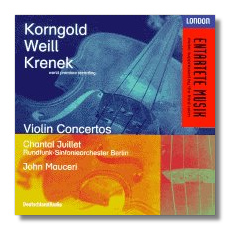
The Internet's Premier Classical Music Source
Related Links
- Latest Reviews
- More Reviews
-
By Composer
-
Collections
DVD & Blu-ray
Books
Concert Reviews
Articles/Interviews
Software
Audio
Search Amazon
Recommended Links
Site News
 CD Review
CD Review
Violin Concertos

- Erich Wolfgang Korngold: Violin Concerto in D Major, Op. 35
- Kurt Weill: Concerto for Violin and Wind Orchestra, Op. 12
- Ernst Krenek: Violin Concerto #1, Op. 29
Chantal Juillet, violin
Berlin Radio Symphony Orchestra/John Mauceri
London 452481-2 "Entartete Series" DDD 76:56
Erich Wolfgang Korngold (1897-1957) wrote an undeniably beautiful violin concerto near the end of the Second World War, despite its conservative language and intemperately debonair veneer. He had left his native Austria in 1934 for the United States and taken up permanent residence in California, where he launched a successful career writing film scores. The concerto is based on themes he used in four such cinematic efforts, themes whose new guise hardly masked the air of a splashy, saccharine Hollywood, with images of Errol Flynn and Olivia de Havilland, of sweet romance and cliff-hanger heroism. Not that the work is weak, mind you – it's well-crafted, tuneful and virtuosic. Still, it's nowhere near the level of inspiration found in the other two works offered here. Chantal Juillet plays the concerto with utter commitment and meets every technical demand with seeming ease. I recently reviewed the Mathé/Litton performance on Dorian, where the violinist's tone sounded a bit harsh at times. Juillet is clearly preferable to my ear.
Kurt Weill (1900-1950) composed his Schoenberg-flavored violin concerto in 1924. I don't mean to suggest it's a twelve tone product: Schoenberg himself was still composing his 5 Piano Pieces (Op. 23) at the time, the first work where he fully employed his new technique. Still, Weill's orchestration and harmonies suggest the Second Vienna School; but where Schoenberg is generally dead-serious, Weill is here humorous and morose, often mixing the two together as if they were indistinguishable. When a theme appears in the first movement at 2:25 (track 4) that sounds like a close cousin of the "dies irae", one wonders if it's parodistic or serious. I'll vote for parody, or at least for humor. The second movement presciently invokes early Shostakovich, whose first serious composition, the Symphony #1, hadn't yet been composed. Here the humor and fun are obvious. The finale is a kind of hodgepodge: muscular and dry at the outset, swooning and nearly songful in the middle, and rambunctiously spirited at the close. Chantal Juillet turns on the acid a bit and adroitly captures Weill's darkness and dark humor. If she can so sweetly deliver the Korngold, then turn grim and deliciously sour in the Weill, her interpretive range is imposingly wide, indeed.
The concerto by Ernst Krenek (1900-1991) is the most dour-sounding work by far here. It is, however, not without its moments of peaceful, even beautiful, repose: the middle section of the opening movement is rather tender and soaring, if a bit tense harmonically. This 1924 work is slightly more compact than its disc mates, lasting just over twenty minutes. Again, the influence here is Schoenberg, but, as with Weill, it is not a dominating factor throughout the piece. The first movement is fraught with tension, but counterbalanced by a feeling of hope. The following Adagio is dark and mysterious, and offers a cadenza of considerable virtuosity and expressive depth. The finale begins eerily and quickly becomes intense and driven, but, in its quiet, puzzling ending, does not offer a resolution to the grim issues the work raises. Again Juillet is right on target in this great piece. It must be said that John Mauceri abets her with consistently insightful accompaniment and must take equal credit for these excellent performances.
London's "Entartete" series, by the way, features music suppressed by the Nazis, or music by composers displaced by them. It is a godsend, with a treasure trove of masterful compositions previously neglected. The sound and notes on this release are excellent. In sum, this is a fascinating issue.
Copyright © 1997, Robert Cummings


















